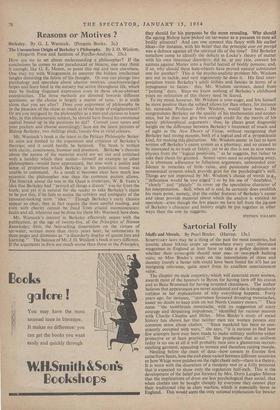Reasons or Motives ?
Berkeley. By G. J. Warnock. (Penguin Books. 2s.) The Unconscious Origin of Berkeley's Philosophy. By J. 0. Wisdom. (Hogarth Press and Institute of Psycho-Analysis. 25s.)
How are we to set about understanding a philosopher? If the conclusions he comes to are paradoxical or bizarre, one may think it enough, like G. E. Moore, to point this out and turn elsewhere. One may try with Wittgenstein to uncover the hidden intellectual tangles distorting the fabric of his thought. Or one can plunge into psychology and speculate about ulterior motives, unacknowledged hopes and fears bred in the nursery but active throughout life, which may be finding disguised expression even in these oh-so-abstract eccentricities. The three methods are directed towards different questions, so the choice is largely a matter of taste. Is it truth alone that you are after? Does your enjoyment of philosophy lie in the pleasure of the chase as much as in` the hope of enlightenment? Or are you intrigued by the philosopher as a man and curious to know why, in this idiosyncratic subject, he should have found his emotional capital bound up in the positions he did? Consult your tastes and your pockets and choose accordingly: here are the latest pictures of Bishop Berkeley, two shillings plain, twenty-five in vivid colours.
Mr. Warnock's book is the latest in the Pelican Philosophy Series: its aims are limited to the exposition and criticism of Berkeley's theories; and it could hardly be bettered. The book is written with clarity, conciseness, humour and precision. Berkeley's theories about the nature of the material world are set out and criticised with a lucidity which their author—himself an example to other philosophers—would have appreciated, but also with a justice and sense of proportion which Berkeley in his polemical mood was unable to command. As a result it becomes clear how much less eccentric the philosopher was than the common picture allows. The limerick about the tree in the Quad is irrelevant; W. B. Yeats's idea that Berkeley had "proved all things a dream" was far from the truth; and yet it is natural for the reader to take Berkeley's claim to be just this, if he fails to notice the subtlety and ambiguity of the Innocent-looking term "idea." Though Berkeley's early classics appear so clear, they in fact require the most careful reading, and even with charity cannot be freed from crucial inconsistencies: faults and all, whatever can be done for them Mr. Warnock here does.
Mr. Warnock's interest in Berkeley effectively ceases with the publication, at the age of twenty-live, of the Principles of Human Knowledge; Skis, the best-selling dissertation on the virtues of tar-water, written more than thirty years later, he summarises in three pages and dismisses, as "a disorderly display of quaint lore and learning." The balance of Mr. J. 0. Wisdom's book is very different. If the arguments in Siris are much worse than those in the Principles, they should for his purposes be the more revealing. Why should the ageing Bishop have picked on tar-water as a panacea to cure all bodily ailments? And can one connect this fancy with his earlier ideas—for instance, with his belief that the principle esse est percipi was a defence against all the spiritual ills of the time? Did Berkeley . somehow come to identify the defects in Locke's theory of matter with his own intestinal disorders; did he, at any rate, convert his animus against Matter into a fearful hatred of bodily poisons; and, if so, why should these hate-objects have proved natural substitutes one for another? This is the psycho-analytic problem Mr. Wisdom sets out to tackle, and very ingeniously he does it. His final inter- pretation treats Berkeley's adult foibles and fancies in terms of a repugnance to faeces : this, Mr. Wisdom surmises, dated from "potting" days. Since we know nothing of Berkeley's childhood years no refutation of this theory need be feared. To my mind, however, Mr. Wisdom is over-eager, and lets himself be more positive than the subject allows (or than others, for instance his namesake Professor John Wisdom, would have been.) He congratulates Berkeley on the quality of his mathematics and econo- mics, but he does not give him enough credit for the merits of his purely philosophical arguments : thus, he places great diagnostic weight on the difference between Berkeley's treatment of touch and -of sight in the New Theory of Vision, without recognising that Berkeley had strong reasons, both of a logical and of a propmdeutic kind, for making this distinction. Mr. Wisdom seems in fact to have written off Berkeley's entire system as a phantasy, and so ceased to be interested in its truth or falsity; yet to do this is not to save meta- physics from the "logical positivists," as he suggests, but rather to take their thesis for granted. Sound views need no explaining away. It is obstinate adherence to fallacious arguments, unbounded con- fidence in remedies of little value, and passionate advocacy of nonsensical systems which provide grist for the psychologist's mill. Things are not improved by Mr. Wisdom's choice of words (e.g., "defecation would be two .edged") or by his use of "doubtless," "clearly" and "plainly" to cover up the speculative character of his interpretation. Still, when all is said, he certainly does establish his main point, namely, that the odder features of Berkeley's career and ideas provide material about which the analyst is entitled to speculate—even though the few pieces we have left from the jig-saw of Berkeley's character and history might be put together in other ways than the one he suggests.
STEPHEN TOULMIN


































 Previous page
Previous page